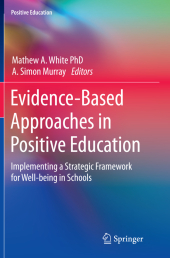 Neuerscheinungen 2016Stand: 2020-02-01 |
Schnellsuche
ISBN/Stichwort/Autor
|
Herderstraße 10
10625 Berlin
Tel.: 030 315 714 16
Fax 030 315 714 14
info@buchspektrum.de |

A. Simon Murray, Martin Seligman, Mathew A. White
(Beteiligte)
Evidence-Based Approaches in Positive Education
Implementing a Strategic Framework for Well-being in Schools
Herausgegeben von White, Mathew A.; Murray, A. Simon; Mitarbeit: Seligman, Martin
Softcover reprint of the original 1st ed. 2015. 2016. xxxiii, 181 S. 27 SW-Abb., 21 Tabellen. 235 mm
Verlag/Jahr: SPRINGER NETHERLANDS; SPRINGER 2016
ISBN: 9402401083 (9402401083)
Neue ISBN: 978-9402401080 (9789402401080)
Preis und Lieferzeit: Bitte klicken
Based on action research and implementation at one of the worldīs great schools, this book provides a much-needed exploration of how to implement positive education at a whole school level. Evidence-Based Approaches in Positive Education summarises the integration of a whole-school mental health and well-being strategy, positive psychology programs and pastoral care models from 3 - 18 years of age. Positive education is the teaching of scientifically validated programs from positive psychology and character education that have an impact on student and staff well-being. It is an approach that focuses on teaching, building and embedding social and emotional learning throughout a studentīs experience. St Peterīs College - Adelaide is the only institution in the world to integrate Martin Seligmanīs well-being theory throughout all aspects of both its strategic intent and positive education programs. The Schoolīs vision is to be a world-class school where all boys flourish. Its mission is to provide an exceptional education that brings out the very best in every boy. This is done within an intellectually and spiritually rich environment that nurtures international-mindedness, intercultural understanding, respect and a commitment to social justice. This book captures the developments of the St Peterīs College journey. It focuses on the integration of well-being across seven strategic goals: Academics; Well-being; Student Life; Entrepreneurship; Innovation and Partnerships; People, Culture and Change; Sustainability and Environment; Community Engagement, Advancement, and Philanthropy. A uniquely Australian school, the impact of a St Peterīs College education is to build great men: who believe safety, service and integrity and fundamental parts of their lives; who are active members of communities that are socially and culturally diverse; who engage in political, ethical, and environmental challenges as good citizens. Since 1847, St Peterīs College alumni have had global and life-changing impact in all fields of human endeavour. The Schoolīs alumni include three Nobel Laureates, 42 Rhodes Scholars, Olympians and Archbishops, artists and scientists, educators and journalists, actors and politicians, philanthropists and physicians, CEOs, diplomats and soldiers, explorers, painters and poets. This book shares evidence-based practices and makes a substantial contribution to the rapidly developing field of positive psychology and its application in schools.
Foreword; Martin Seligman.- Preface.- Chapter 1. Building a Positive Institution; Mathew White and Simon Murray.- Chapter 2. A Comparison between Theological Christian Approaches to Wisdom and Peterson and Seligmanīs Classification of Character Strengths and Virtues; Theodore McCall, Lea Waters and Mathew White.- Chapter 3. Leading Whole-School Change; Lea Waters, Mathew White and Simon Murray.- Chapter 4. Measuring Whole School Well-Being in Students and Staff; Margaret Kern, Alejandro Adler, Lea Waters and Mathew White.- Chapter 5. Positive School Psychology; Zo Alford and Mathew White.- Chapter 6. Strengths-Based Approach in the Classroom and Staffroom; Mathew White and Lea Waters.- Chapter 7. Character Education: A Role for Literature in Cultivating Character Strengths in Adolescence; Emily FitzSimons.- Chapter 8. Student Leadership and PERMA; John Vrodos, Tom McNeil with Mathew White.- Chapter 9. Future Directions in Well-Being; Mathew White and Simon Murray.


